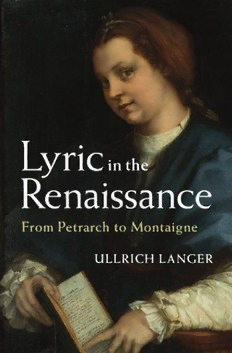
Lyric in the Renaissance: from Petrarch to Montaigne PDF
Preview Lyric in the Renaissance: from Petrarch to Montaigne
LYRIC IN THE RENAISSANCE Moving from a definition of the lyric to the innovations introduced by Petrarch’s poetic language, this study goes on to propose a new reading of several French poets (Charles d’Orléans, Ronsard, and Du Bellay), and a re-evaluation of Montaigne’s understanding of the most striking poetry and its relation to his own prose. Instead of relying on conventional notions of Renaissance subjectivity, it locates recurring features of this poetic language that express a turn to the singular and that herald lyric poetry’s modern emphasis on the utterly particular. By combining close textual analysis with more modern ethical concerns this study establishes clear distinctions between what poets do and what rhetoric and poetics say they do. It shows how the tradition of rhetorical commentary is insufficient in accounting for this startling effectiveness of lyric poetry, manifest in Petrarch’s Rime sparse, and the collections of the best poets writing after him. Ullrich Langer is Alfred Glauser Professor of French and Director of the Center for Early Modern Studies at the University of Wisconsin, Madison. He has published widely in the field of French and Italian literature, and is the editor of The Cambridge Companion to Montaigne (Cambridge, 2005) and the author of Penser les formes du plaisir littéraire à la Renaissance (2009). LYRIC IN THE RENAISSANCE From Petrarch to Montaigne ULLRICH LANGER University Printing House, Cambridge CB2 8BS, United Kingdom Cambridge University Press is part of the University of Cambridge. It furthers the University’s mission by disseminating knowledge in the pursuit of education, learning and research at the highest international levels of excellence. www.cambridge.org Information on this title: www.cambridge.org/9781107110281 © Ullrich Langer 2015 This publication is in copyright. Subject to statutory exception and to the provisions of relevant collective licensing agreements, no reproduction of any part may take place without the written permission of Cambridge University Press. First published 2015 Printed in the United Kingdom by Clays, St Ives plc A catalogue record for this publication is available from the British Library Library of Congress Cataloguing in Publication data Langer, Ullrich. Lyric in the Renaissance : from Petrarch to Montaigne / Ullrich Langer. pages cm Includes bibliographical references and index. ISBN 978-1-107-11028-1 (hardback) 1. French poetry–16th century–History and criticism. 2. Montaigne, Michel de, 1533–1592–Criticism and interpretation. 3. Lyric poetry–History and criticism–Theory, etc. 4. Petrarca, Francesco, 1304–1374–Language. 5. Particularity (Aesthetics) I. Title. II. Title: Petrarch to Montaigne. PQ418.L35 2015 841′.309–dc23 2015003683 ISBN 978-1-107-11028-1 Hardback Cambridge University Press has no responsibility for the persistence or accuracy of URLs for external or third-party internet websites referred to in this publication, and does not guarantee that any content on such websites is, or will remain, accurate or appropriate. For Anne Contents Acknowledgments page viii 1 Introduction 1 2 Petrarch and the existential singular 21 3 Minimal lost worlds: The rondeaux of Charles d’Orléans 49 4 Ronsard’s singular erotic reciprocity (Les Amours de Cassandre) 73 5 Singularity as emptiness: Du Bellay’s Regrets 102 6 Montaigne and his “sublime” lyric 125 7 Conclusion 151 Notes 160 Bibliography 201 Index 214 vii newgenprepdf Acknowledgments My gratitude for generous readings and help in this dense terrain that is the lyric, Petrarchan or classical or modern, go to Albert Russell Ascoli, François Cornilliat, Heather Dubrow, Edwin Duval, William Fitzgerald, James Helgeson, David Hildner, Ernesto Livorni, Kristin Phillips-Court, Anne Theobald, and Steven Winspur. I have profited from questions, objections, and puzzlement expressed by many of my students and col- leagues, and I have learned from comments by and exchanges with Grace Armstrong, Jonathan Culler, Scott Francis, Deborah Fried, Francis Goyet, Olivier Guerrier, Steven Hutchinson, Douglas Kelly, William J. Kennedy, Virginia Krause, Kathleen P. Long, Alison Lovell, Jan Miernowski, and David Sedley. Linda Bree has been a patient and persistent guide, Anna Bond most helpful in the intricacies of publication. Laurent Ferri and Patrick J. Stevens of the Cornell University library have been encour- aging and sure experts of the incomparable Fiske collection of Renaissance Petrarch material. I am thankful as well to the University of Wisconsin, Madison, for a research leave and to the Wisconsin Alumni Research Foundation for valuable material support during the past few years, with- out either of which this project would have taken much longer to come to fruition. viii
